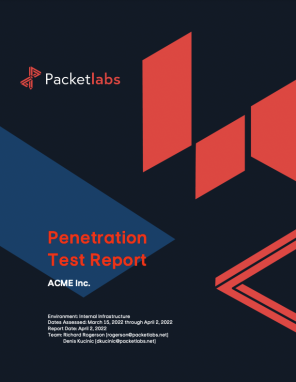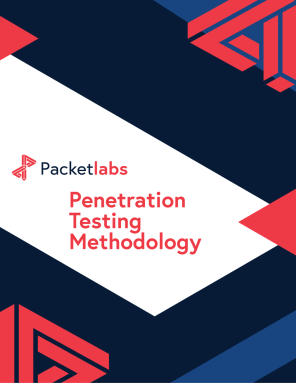Services Infrastructure Penetration Testing
An Infrastructure Penetration Test uncovers vulnerabilities residing within your infrastructure and provides a detailed attack narrative to help evaluate the impacts of each finding. This service discovers vulnerabilities in networks, Active Directory, operating systems, and third-party software packages, alongside configurations, and attempts to exploit them to measure risk effectively.
What's included:
Demonstrated impact to help with executive and developer understanding
Comprehensive reporting with detailed step-by-step instructions to reproduce
Advisory on remediation steps and retesting to validate closure of findings
Contact Us
What's included:
Demonstrated impact to help with executive and developer understanding
Comprehensive reporting with detailed step-by-step instructions to reproduce
Advisory on remediation steps and retesting to validate closure of findings
Service Highlights
Outsmart Your Adversaries
Packetlabs tests your controls like real adversaries do—avoid writing to disk, living off the land, and cycling payloads until we evade your AV or EDR. When we finally pop the crown jewels, you gain proof of exactly which controls stopped working, so you can shore them up before an attacker does.

The Packetlabs Difference

Beyond Automated Testing
While automated scanners scrape the surface, Packetlabs’ expert-led penetration tests probe the logic, business workflows, and chained exploits that scanners routinely overlook. Leveraging manual exploitation techniques, threat-intel-driven scenarios, and creative lateral thinking, our team exposes high-impact vulnerabilities competitors miss and translates them into clear, fix-ready guidance. The result is a much higher assurance level than conventional "smash-and-grab" pentests that help you sleep better at night.

Custom-tailored Engagements
Every organization faces a distinct attack surface, so Packetlabs begins every engagement by hand-crafting a threat model and test plan that map precisely to your business, technologies, and risk priorities—no off-the-shelf checklists, ever. Because our process is 100% tester-driven, seasoned experts—not automated tools—decide where to probe deeper, pivot laterally, and chain exploits that off-the-rack methodologies would never attempt. The payoff is intelligence you can actually act on: a crystal-clear roadmap of vulnerabilities and remediation steps that’s as unique as your environment and ready to support security, compliance, and board-level decisions.

Continuous Improvement
Threat actors innovate every day, so our playbook can’t stand still. After each engagement, our testers feed the latest exploit paths, red-team lessons, and threat-intel insights back into our proprietary checklists and methodologies, evolving them in real time. When we arrive at your environment, you’re protected by a continuously improved framework that already accounts for the newest tactics most competitors won’t confront until next year.

Defence in Depth
For over 12 years, Packetlabs has guided security leaders across North America to victory against real-world breaches. Acting like the adversary, our experts go beyond the initial target pivoting through every in-scope system to stress-test your detection layers so you can see exactly how your “defense in depth” holds up. The result: not a single client has ever been compromised by a vulnerability we missed, giving you board-ready proof that your organization is well defended.
Why Conduct Infrastructure Penetration Testing?
Board-Level Assurance
Your executive team is under constant pressure to prove that security investments are working. Infrastructure penetration testing turns that anxiety into clarity: our experts map your environment, exploit real attack paths, and package the results in a board-ready report that speaks revenue risk, not router configs. When directors see a simple three-step plan—Recon & Mapping → Network Attacks → Post-Exploitation validation—they know exactly how the company will stay out of tomorrow’s breach headlines and why approving next quarter’s security budget is non-negotiable.
Avoid a Costly Breach
The average remediation and downtime price-tag for a North-American breach now tops seven figures, but those numbers drop to near-zero when exploitable holes are found before criminals arrive. By treating every engagement like a live adversary—pivoting across Active Directory, cloud hybrids, and legacy subnets—we surface the one forgotten credential store or misconfigured firewall rule that could otherwise bankroll an attacker. The cost of a proactive pentest is a rounding error compared to the financial, legal, and reputational fallout of a breach.
Find Vulnerabilities Others Overlook
Automated scanners stop at open ports; Packetlabs testers keep digging. Our 100 % tester-driven methodology layers manual discovery, privilege escalation, and chained exploits that check-box assessments miss, revealing business-logic flaws and abuse paths hidden deep inside production networks. Whether it’s an obscure cross-forest trust in Active Directory or an overlooked service account in a hybrid cloud, we expose weaknesses most competitors never even look for—giving you an edge attackers can’t predict. We lose sleep over exploits so you don't have to.
Demonstrate Real-World Impact
Stories move people more than spreadsheets. That’s why every Packetlabs report includes vivid evidence—screenshots, command traces, and “step-by-step replay” narratives—showing how we breached a segment and what could have happened next. Stakeholders don’t just hear about risk; they see it, feel it, and get a clear remediation roadmap. The result is a unified call to action across IT, compliance, and the boardroom: fix the findings, strengthen the stack, and move forward with confidence.
Resources

Penetration Testing Sample Report
Take a look at our sample infrastructure penetration testing report to get a better understanding of what information will be delivered in the final report.
Download Sample Report
Penetration Testing Methodology
Our Penetration Security Testing methodology is derived from the SANS Pentest Methodology, the MITRE ATT&CK framework, and the NIST SP800-115 to uncover security gaps.
Download Methodology









